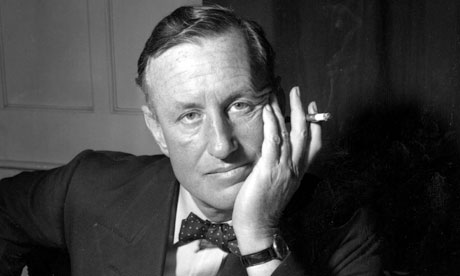
Some believe he dreamed up James Bond to be the bon vivant, daring and cultivated epitome of masculinity he could never quite live up to. In at least one regard, however, Ian Fleming is about to mimic his most famous creation: the author and former second world war naval commander is to be the subject of his very own movie, from the director of Moon and Source Code, Duncan Jones.
Jones will base his biopic on an adaptation by screenwriter Matthew Brown of Andrew Lycett's biography The Man Behind James Bond. The film reportedly has the support of the Fleming estate and is set to go into production later this year. It is something of a departure for Jones, whose two feature films thus far have had science fiction themes.
The celebrated writer's life may not have been quite as exciting as that of 007, but it had more than its fair share of drama. Born into a wealthy English family with Scottish roots, the young Fleming was removed from Eton College a term early by his mother after falling out with a housemaster who disapproved of his playboy lifestyle. He subsequently flunked out of the Royal Military Academy at Sandhurst after contracting gonorrhoea. Women, often those married to other men, were a constant presence in Fleming's life, and he did not marry until he was 44, to Anne Charteris, a divorced woman with whom he had been having an affair for more than a decade.
Much of Fleming's background for the Bond novels was drawn from his years in British naval intelligence during the second world war, a career he embarked upon after failed attempts at banking and stockbroking. Prior to that, he had found more success as a journalist for the Reuters agency, once receiving a signed apology from Stalin for being unable to attend an interview following a high-profile court case in Russia. It was the latter career Fleming later credited with gifting him the writerly skills that helped forge the Bond novels.
"Fleming lived through one of the most perilous periods in world history, in a position that allowed him a unique vantage point of all the players, all the stakes," said Jones in a statement. "He witnessed true heroism firsthand. And he saw the evil men could do. Then, when the war ended, he went off to write fiction. The essential question for me is: where did Ian Fleming end and Bond begin?"
Like his creation, Fleming drank and smoked (around 60 cigarettes a day) throughout his life, the effects of which probably contributed to an early death in 1964 at the age of 56, following several heart attacks. He spent his final years at the Goldeneye estate in Jamaica, where he had been living for three months annually for more than a decade to write.
Fleming is said to have masterminded a number of ingenious missions during the war, including a ploy to seize a Nazi Enigma decoding machine, which never came to fruition. The idea was subsequently borrowed for the plot of 1957's From Russia With Love, which focuses on a Smersh bid (Spectre in the 1963 film) to lure 007 into a trap with the promise of a Soviet decoding unit.
The writer was instrumental in the formation of the 30 Assault Unit of intelligence commandos, which he oversaw from the rear during the war. The unit, initially 30-strong but later expanded, was trained in lock-picking, safe-cracking and unarmed combat. Last year's action thriller Age of Heroes used the 30 Assault Unit as its focus and starred James D'Arcy as Fleming.
Intriguingly, Jones's film is described as a "period action movie about the life of Fleming and the origins of Bond", suggesting it may take the writer's wartime experiences as a starting point. It will arrive at a time when interest in 007 and his creator has rarely been more intense, with the Eon-produced Bond movies having just celebrated 50 years of production and the company's latest film, Skyfall, premiering in October.
A separate Fleming biopic, with James McAvoy and Leonardo DiCaprio each at one point reportedly set to play the writer, was announced in 2008 by DiCaprio's Appian Way production company, but remains in development.

